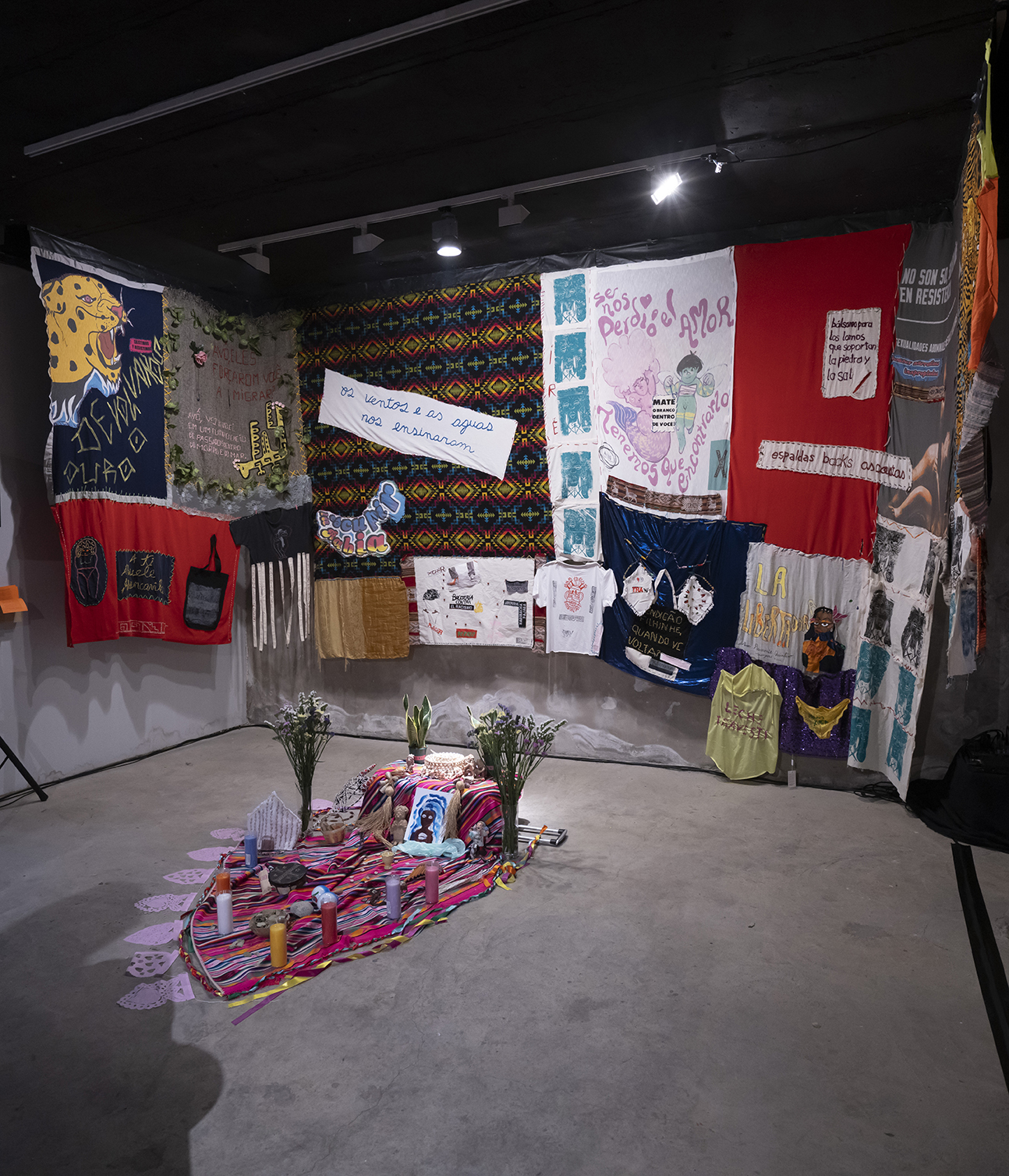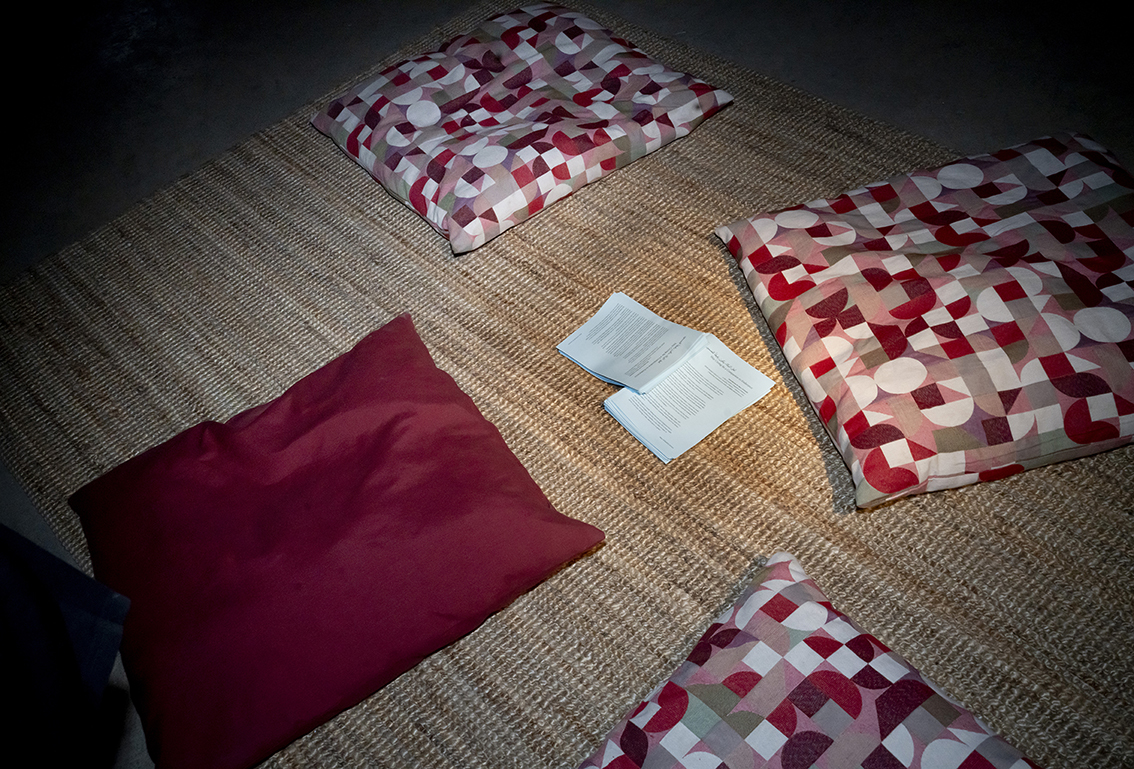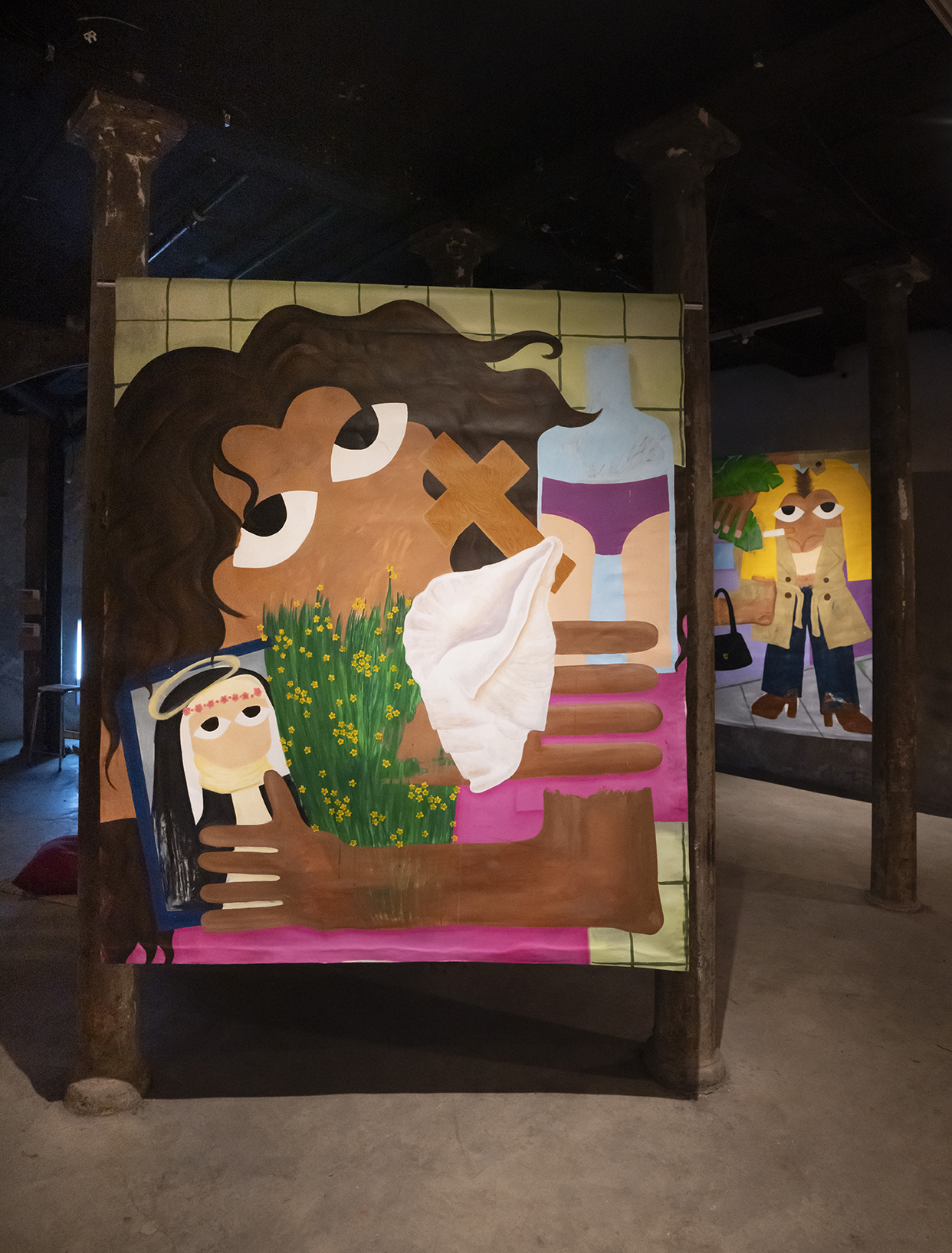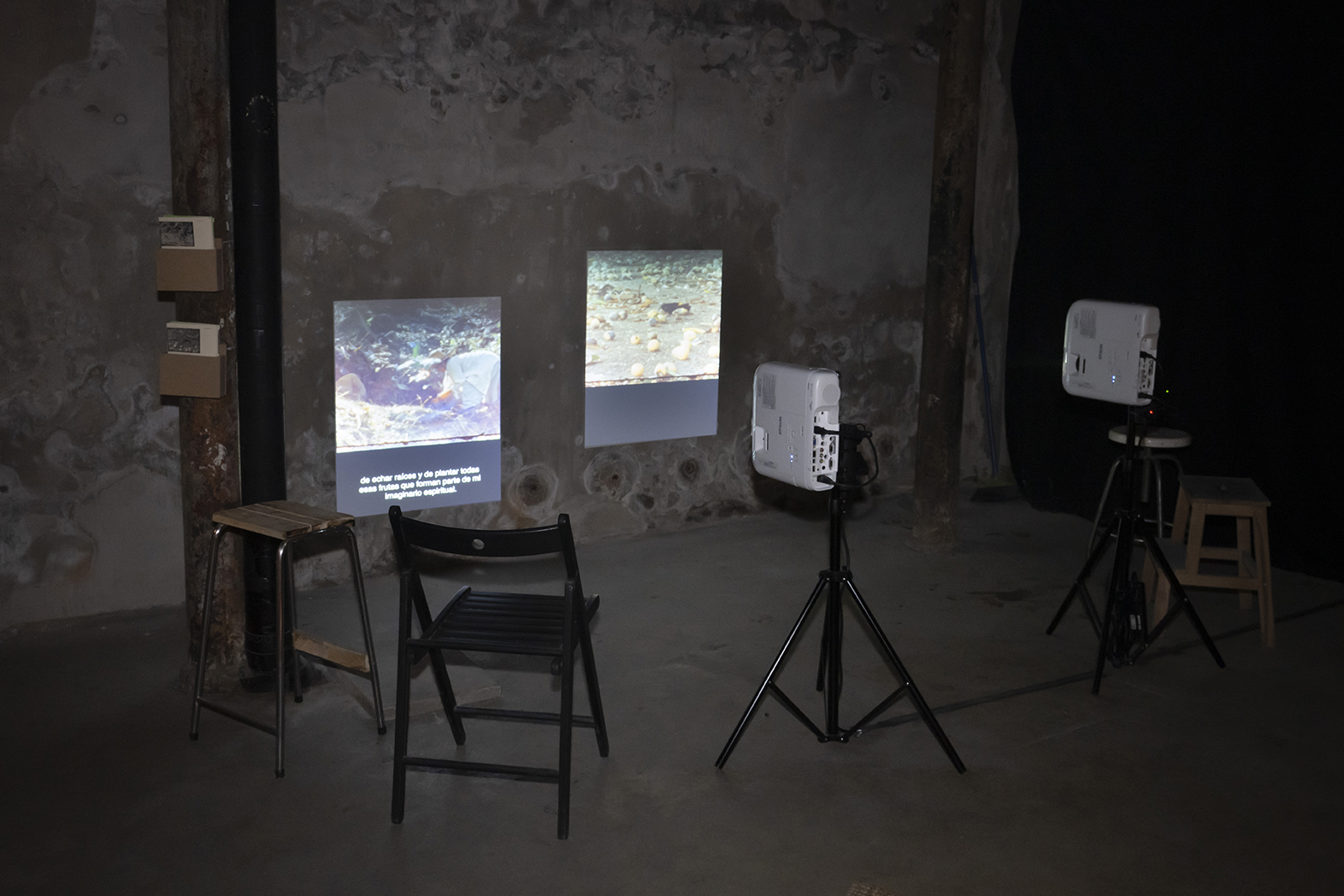YC
RP
FS
RR
Young Curators Residency Programme
Since 2020, Fondazione Sandretto Re Rebaudengo promotes the Young Curators Residency Programme Madrid. The project aims to support emerging curatorial practice while spreading knowledge of the Spanish art scene on an international level. The YCRP Madrid stems from the experience of the Young Curators Residency Programme Torino, that takes place every year in Italy since 2007.
Young Curators Residency Programme 2025 Coordinated by hablarenarte
Nadie Nunca Nada No: C/ Arganzuela 9 6.06.2025 - 2.07.2025
Tactics Against Apathy
Apathy is not absence. It is a structure of delay, repetition, and deferral. It regenerates quietly under the weight of systems that prefer inertia. In this logic, linear histories march linearly toward foreclosed futures; colonial modernity plants the seeds of colonial futurity–unless, of course, something is interrupted.
To interrupt what appears predetermined is not simply a matter of resistance, but of attention—of noticing the cracks in what claims to be inevitable, and prying them open. Possibility does not arrive fully formed; it emerges in gestures, refusals, transgressions, and solidarities; in the minor acts through which the pace of the present is disturbed, and the script of the future hesitates.
In rejection of the myth of inevitability, and a commitment to the labor of imagining otherwise, the practices on display in this exhibition propose ways of interrupting apathy—not through spectacle, but in stubborn, daily, often quiet acts of resistance and reconfiguration.
Refusal is not an end in itself, but a beginning
Curators
Henriette Gillerot
Henriette has a particular interest in topics related to the sense of place and space, the concept of landscape and the notion of interiority. In her curatorial projects, she examines from a historical and ecological perspective how we come to know spaces and how we might live with their evolving conditions.
She holds a Master’s degree in Art History and Archaeology from the VUB, Brussels (2021) and a Master’s degree in Curating from Goldsmiths College, London (2023). During her studies, she was assistant curator for the 2nd edition of the Dunkirk Triennial (2023) alongside curators Anna Colin and Camille Richert. The following year, she worked as a curatorial fellow at the Goldsmiths Centre for Contemporary Art (CCA) (2024). In parallel to these institutional positions, she has collaborated on small-scale artist projects in London and Belgium.
Elias Rizek
Elias Rizek is a Palestinian curator from Jerusalem, and the founder of Al-Mustawda3, an independent cultural space in Ramallah. At Al-Mustawda3, Elias curated a number of exhibitions and collaborated with many in developing a public programme that spanned visual arts, music, theatre, cinema, and education. Elias’s curatorial practice is grounded in decolonial methodologies that reconsider conventional institutional frameworks. He employs a speculative approach to explore how enmeshed colonial structures shape contemporary artistic production, proposing collective-first modes of instituting instead. In 2024, Elias completed his MA in Curating Contemporary Art at the Royal College of Art, UK.
Chadrack Kakule
Congolese born Chadrack Kakule is a researcher and curator. The main strands of his practice are primarily concerned with alternative epistemologies, non-extractive curatorial/artistic practices and contemporary art from Africa. His work examines the role of curatorial research in addressing the histories that have been affected by extractivism.
He has participated in various curatorial and educational programs, including the Independent Curators International (ICI) Curatorial Intensive in Kampala, Uganda (2022) and the Zeitz MOCAA & the University of the Western Cape Museum Fellowship program (2024). He participated in Documenta Fifteen as member of Centrer d’art Waza -a group of artists and curators based in Democratic Republic of the Congo as well as a member of Another Roadmap Africa Cluster – an international network of practitioners and researchers who are working toward art education as an engaged practice in museums, cultural institutions, educational centers, and grassroots organizations.
Coordinator
hablarenarte
Written in lower case and in constant mutation, hablarenarte is a non-profit organization based in Madrid that has been working since 2002 in the field of cultural mediation, artistic education, expanded curating and contemporary creation.
Emma Brasó is a curator at the contemporary creation team of hablarenarte and Visiting Lecturer at the Fine Arts Department of the Universidad Complutense de Madrid. She holds a PhD from Royal College of Art (London) based on her research on the intersection of fiction and authorship since the 1980s. Before that, she obtained a master’s degree in Curatorial Studies at Columbia University (New York) with a grant from ‘la Caixa’ Foundation.
Artists
- Colectivo Ayllu
Colectivo Ayllu is a collaborative artistic-political action and research group formed of migrant, racialised, sexual and gender dissident people of former Spanish colonies in Latin America and the Caribbean. They live and work between Madrid and Barcelona. The collective was born in 2017 (from a branch of the activist collective Migrantes Transgresors, created in 2009) and offers a criticism of colonialism, whiteness, and heterosexuality, carrying out artistic production in multiple formats and generating processes of collective learning, mediation, and written production. Ayllu -which in quechua language refers to an extended family- represents an affective community, a family that is woven from diverse origins, recovering ancestral memories and transiting with alternative poetics to collective futures. Members include Alex Aguirre Sánchez, Kimy Rojas Miranda, Lucrecia Masson Córdoba, Iki Yos Piña Narváez and Francisco Godoy Vega.
![]()
- Las Jamaiconas
Las Jamaiconas is an art, cooking, and activism project formed by Lina Ruiz (Bogotá, Colombia), Columba Zavala (CDMX, Mexico), and Mariana Alva (Lima, Peru), primarily based in Barcelona. Our work is framed within the context of the eco-social crisis and involves a constant reflection on migration, territory, and anti-racist struggles. Our practice stems from performance, installation, audiovisual media, writing, and educational mediation, among others. We are interested in generating hybrid spaces, playing with the boundaries between art and cooking to question and imagine other ways of thinking and doing. We understand that, in the kitchen, the act of cooking and commensality merge diverse artistic languages to stimulate embodiment, non-hegemonic knowledge, and the creation of imaginaries. That’s why we want to continue building spaces for exploration and exchange where we can propose other narratives in educational settings, food culture outreach, community kitchens, critical thinking communities, and diverse groups of people interested in exploring other ways of connecting. Our goal is to promote a project of art, cooking, pedagogy, and activism that will allow us to build a safe space for resistance, creation, training, exchange, and political action. Members include Lina Ruiz, Columba Zavala and Mariana Alva.
![]()
- Maya Al Khaldi & Sarouna
Maya Al Khaldi is an artist, musician and composer from Palestine, based in Jerusalem. Maya’s work explores voice and the music of the past and present, working with archival materials to imagine the future. Her debut album “تاني عالم – Other World” is inspired by Palestinian folklore, influenced by the present, to imagine a sonic future.
Sarouna is a Palestinian music producer, audio engineer, DJ, and qanun player based in Jerusalem. Her practice moves fluidly between the acoustic and the electronic, reimagining the qanun not only as a melodic instrument but as a source of texture, feedback, and rhythmic structure within experimental sound design. At the core of her work is sonic storytelling: crafting emotionally layered compositions that emerge from cultural memory, resistance histories, and speculative imagination. Sarouna is the founder of Tawleef, a women-led Palestinian artist space and record label that supports experimental and independent sound practices.
![]()
- Ximena Ferrer Pizarro
Ximena Ferrer Pizarro (1994, Lima) uses painting as a tool to tell stories that challenge structures of power, blending autofiction, visceral sincerity, and the dramatic-humorous language of telenovelas. Her sensitive and energetic scenes feature characters who stare defiantly at the viewer: some cry, others enjoy life fearlessly, but most fight for a protagonism that has historically been denied to them. With irreverence that does not shy away from the personal, her work confronts class hierarchies and the deep wounds colonialism leaves on bodies. Her narratives go beyond the Latin American context and address universal themes such as conservative family structures, colonial trauma, and intersectional feminism. In them, she presents anthropomorphic characters who tell their own stories— hard, weird and funny.
![]()
- Claudia Claremi
Claudia Claremi is an artist and filmmaker whose work spans video, analog film, installation, photography, and archival practices. Her interdisciplinary projects have been showcased at venues such as CVA Denver, MAMM Medellín, HKW Berlin, Museo CA2M, La Casa Encendida, PhotoEspaña, and Museo Reina Sofía in Madrid. Her films have been featured in international festivals, including Rotterdam, Ann Arbor, Raindance, and Guadalajara. Claremi holds degrees from the International Film School in San Antonio de los Baños (Cuba) and the University of the Arts London. She has also participated in residencies at Beta-Local and San Juan 721 (Puerto Rico), CRA Matadero (Madrid), Visual Studies Workshop (Rochester, NY), The Clemente (NY), and El Espacio 23 (Miami) as the PAMM + WOPHA Fellow. Her practice explores memory, identity, and the intersection of personal and collective histories, addressing issues of embodiment, diaspora, coloniality, and phytoculture, particularly the relationship between humans and plants.
![]()
Claudia Caremi
Jury
Sergio Rubira
Sergio Rubira is the artistic director of the TEA Tenerife Espacio de las Artes museum and has been the deputy director of collections and exhibitions at the Valencian Institute of Modern Art (IVAM) in Valencia. He was a professor of Contemporary Art History at the Complutense University of Madrid for 16 years, where he was the academic secretary of the Master’s in Contemporary Art History and Visual Culture, a program organized by the university in collaboration with the Reina Sofía Museum and the Autonomous University. He has been a collaborator for El Cultural and deputy director of all publications of the EXIT group. He has co-directed the Madrid45 training program of the Community of Madrid, the Image Study Sessions of the Community of Madrid, and the course Curating the Present at La Casa Encendida. He was part of the curatorial office RMS La Asociación. He has curated exhibitions at CAAC, MUSAC, CGAC, CA2M, La Panera, Temporary Gallery, Centre d’art Santa Mònica, among others. He has written for numerous publications from institutions such as MUDAM, Centre Pompidou-Metz, the Venice Biennale, PS1-MoMA, Tranzit, FRAC Bourgogne, among others.
Amanda de la Garza Mata
Amanda de la Garza Mata (Mexico, 1981) Lives and works in Madrid, Spain.
She is currently Deputy Artistic Director at Museo Nacional Centro de Arte Reina Sofía in Madrid. From 2020 to 2024, she was General Director of Visual Arts and of the University Museum of Contemporary Art (MUAC) at UNAM, one of the most important art museum in Latin America. Trained in Curatorial Studies, Art History, Anthropology and Sociology, between 2012 and 2019 she worked as an associate curator at the MUAC. She has curated and coordinated more than 30 exhibitions of modern and contemporary art, as well as archival exhibitions and solo shows of renowned artists, including Harun Farocki, Hito Steyerl, Vicente Rojo, Jeremy Deller, Isaac Julien, Jonas Mekas, José Dávila and Chantal Peñalosa for museums in Latin America, Europe and the USA. She has published essays, interviews and reviews in catalogues, books and specialized magazines. She has been awarded the Emerging Curators Award at the Borders Biennial and various research grants. She was a member of the board of ICOM Mexico from 2021 to 2024. She is currently a member of AAMD (Association Art Museum Directors) and is part of the board of CIMAM (International Committee for Museums and Collections of Modern Art).
ycrp.fsrr.org
©2026 Fondazione Sandretto Re Rebaudengo




